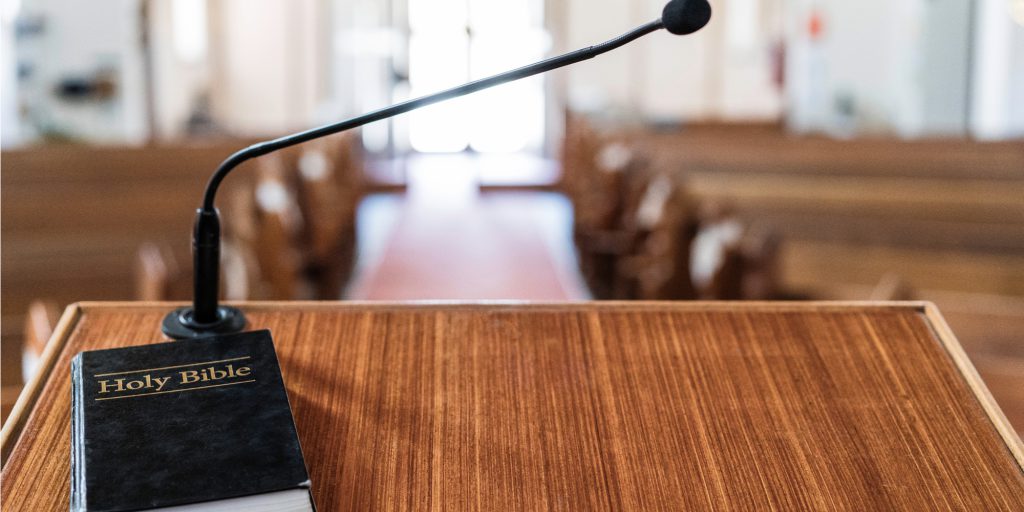
Published June 7, 2021
“This is an earthquake,” a prominent Christian writer told me.
The publication of an extraordinary February 24, 2020, letter by Russell Moore, one of the most influential and respected evangelicals in America (and a friend), has shaken the Christian world.
When the letter was written, Moore was the president of the Ethics and Religious Liberty Commission, the policy arm of the Southern Baptist Convention, the largest Protestant denomination in the United States. The letter, sent to the ERLC’s board of trustees, offers a devastating indictment of the denomination’s executive committee.
Moore’s letter was leaked to Religion News Service (RNS) a few weeks after he resigned from the ERLC. And on June 1, Immanuel Nashville, a church not affiliated with the Southern Baptist Convention, announced that Moore would become its pastor in residence. Which means that one of the most important figures in the SBC has completely broken with the denomination he has been a part of for virtually his entire life.
Moore’s 4,000-word letter explains why.
His departure was not primarily prompted, as many people had assumed, by his role as an outspoken critic of Donald Trump, although that had clearly upset powerful members within the politically and theologically conservative denomination. Instead, the letter suggests, the breach was caused by the stands he had taken against sexual abuse within the SBC and on racial reconciliation, which had infuriated the executive committee. The chair of the executive committee at the time, Mike Stone, is now running for SBC president. According to RNS, “Supporters have touted Moore’s resignation as proof of Stone’s effectiveness as a leader.” (Stone released a statement in response to Moore’s letter, alleging that it contained “numerous misrepresentations,” and calling it an attempt to influence the coming denominational election.)
“The presenting issue here is that, first and foremost, of sexual abuse,” Moore wrote. “This Executive Committee, through their bylaws workgroup, ‘exonerated’ churches, in a spur-of-the-moment meeting, from serious charges of sexual abuse cover-up.”
At the ERLC’s National Conference in 2019, Moore interviewed Rachael Denhollander, a former gymnast who was the first woman to publicly accuse Larry Nassar, the USA Gymnastics doctor, of sexual assault. (Nassar was the perpetrator in the largest sexual-abuse scandal in sports history and will serve the rest of his life in prison.) In the interview, Denhollander criticized the executive committee for how it had handled the case of Jennifer Lyell, who had accused a Southern Baptist seminary professor of abuse.
“The story Rachael told is accurate,” Moore wrote, “and [my wife] and I know that because we were, even during that very meeting, ministering alongside others to that mistreated young woman.”
Moore, in a letter written to the outgoing president of the SBC just more than a week ago, said Lyell “attempted to tell her story of abuse, through the channels of the Executive Committee, and her own words were altered by Executive Committee staff to make it seem as though this horrifying experience had been a consensual affair.” Lyell, a former vice president at the SBC’s publishing arm, Lifeway Christian Resources, told The Washington Post that she had lost her job, her reputation, and her health because of her mistreatment by the SBC’s executive committee, and she confirmed Moore’s account of its “bullying and intimidation.” The Post also reported that three employees who work in SBC institutions, and one former employee, corroborated several of the factual details of Moore’s letter. And Lyell’s account was corroborated by Denhollander. “It shows the level of corruption and vile behavior that comes from the leaders of the SBC, the ones who really have the power,” she told the Post.
That Moore had allowed Denhollander to tell Lyell’s story on stage “enraged some Executive Committee trustee leadership,” he wrote in his letter to the ERLC’s board of trustees. The executive committee was particularly aggrieved, he continued, because it had contributed funds for the Caring Well Conference, co-sponsored by the ERLC, which was intended to address sexual abuse in the church. “I came away from these conversations with the distinct feeling that I was being told … ‘You’ve got a nice little Commission there; would be a shame if something happened to it,’” Moore went on. “I told Maria that at the time. It was, and is, chilling—especially seeing what they had in mind to do under cover of darkness.”
The letter’s next passage was written in bold italics:
I am trying to say this as clearly as I can to you, brothers and sisters: These are the tactics that have been used to create a culture where countless children have been torn to shreds, where women have been raped and then “broken down.”
But confronting sexual abuse wasn’t the only issue dividing Moore from the SBC executive committee. “The other absolutely draining and unrelenting issue has been that of racial reconciliation,” Moore wrote. “My family and I have faced constant threats from white nationalists and white supremacists, including within our convention. Some of them have been involved in neo-Confederate activities going back for years. Some are involved with groups funded by white nationalist nativist organizations. Some of them have just expressed raw racist sentiment, behind closed doors.”
Moore cited specific examples: “One SBC leader who was at the forefront of these behind-closed-doors assaults had already ripped me to shreds verbally for saying, in 2011, that the Southern Baptist Convention should elect an African-American president,” he wrote. “This same leader told a gathering that ‘The Conservative Resurgence is like the Civil War, except this time unlike the last one, the right side won.’ I walked out of that gathering, as did one of you.”
Moore also mentioned an SBC leader who, during a discussion about Black victims of police violence, had asserted that “only those with guns would prevent black people from burning down all of our cities.”
On top of all that, Moore alleged that “vicious guerilla tactics” had been used against him, including task-force investigations whose purpose was “to keep a cloud over me, and to keep me self-censoring and silent about these matters.”
“‘We know we can’t take you down,’” Moore said an SBC figure told him in 2017. “‘All our wives and kids are with you. This is psychological warfare, to make you think twice before you do or say something.’”
Within a day of the publication of Moore’s letter, I heard from people who told me that this whole episode didn’t surprise them. One pastor, who requested anonymity in order to speak openly, put it to me this way:
Having grown up in the South, [I think] Southern Baptist culture is probably uniquely this way, but working in a church that isn’t in the South, this stuff still rears its head. Not as much the same presenting issues, but you still fundamentally get people who are in love with power and will take any means necessary to beat you down so they have power and you are subservient to them, not the Gospel.
Countless people of the Christian faith lead lives of integrity. I have been on the receiving end of profound expressions of grace and generosity from people who have walked alongside me during difficult times. I have seen people who, in the words of the apostle Paul, “shine like stars in the universe.” Throughout history, Christianity has made great contributions to art and literature, to acts of charity and defending human rights. The abolitionist and civil-rights movements can’t be understood without taking into account the role of faith; the same is true of the anti-abortion movement.
I was recently reminded of a story about Evelyn Waugh, who had behaved particularly rudely to a young French intellectual at a dinner party. Waugh was asked by the host, Nancy Mitford, how he could act so meanly and yet consider himself a believing and practicing Catholic. “You have no idea,” Waugh is said to have responded, “how much nastier I would be if I was not a Catholic.”
Nonetheless, something has gone awry; the revelations contained in Russell Moore’s letter were only the latest links in a disturbingly long chain of offenses. In 2019, the Houston Chronicle published a six-part series on abuse within SBC churches. One of America’s most prominent female evangelicals, Beth Moore (no relation to Russell), split with the SBC earlier this year, citing the “staggering” disorientation of seeing denominational leaders support Trump. She has also denounced the “demonic stronghold” of white supremacy and “the sexism & misogyny that is rampant in segments of the SBC.”
“There comes a time when you have to say, this is not who I am,” Beth Moore explained to RNS. “I am still a Baptist, but I can no longer identify with Southern Baptists.”
Yet the problems are hardly confined to the SBC. The Catholic Church has been rocked by horrifying sexual-abuse scandals. Earlier this year, an investigation found credible evidence that Ravi Zacharias, the revered evangelist who died last year, had been engaged in sexual misconduct spanning many years and several continents. The Ravi Zacharias International Ministries board apologized for its role in discrediting one of the women Zacharias exploited and later slandered. And Jerry Falwell Jr. was forced to resign as the president and chancellor of Liberty University, one of the largest evangelical universities in the world, after allegations of sexual misconduct.
But the issues go beyond matters of sexual misconduct and abuse. Christians appear more susceptible than non-Christians to embracing conspiracy theories; 31 percent of white evangelical Christian Republicans believe in the accuracy of the claim that “Donald Trump has been secretly fighting a group of child sex traffickers that include prominent Democrats and Hollywood elites.”
Partisan, cultural, and regional identities tend to shape religious identities. “In American pop-culture parlance, ‘evangelical’ now basically means whites who consider themselves religious and who vote Republican,” according to the Baylor University historian Thomas Kidd. In so many instances, cultural identity is completely dominant over faith; it is the prism through which faith is interpreted. “‘Evangelical’ used to denote people who claimed the high moral ground; now, in popular usage, the word is nearly synonymous with ‘hypocrite,’” Timothy Keller, one of the most influential evangelicals in the world, wrote in The New Yorker in 2017. I have heard from pastors in different parts of America who describe a “generational catastrophe” that is unfolding because of how disillusioned young people, including many young Christians, are by what they have seen.
One of the more incisive comments about the gap we often see between faith and works sticks with me today: that for too many people of the Christian faith, Jesus is a “hood ornament.” The man who told me that was Russell Moore. But a blistering phrase used by Jesus echoes most in my mind. He likened hypocritical religious leaders who abandon their calling and lead others astray to “whitewashed tombs,” which “look beautiful on the outside but on the inside are full of the bones of the dead and everything unclean.”
In their eagerness to defend their faith, many Christians refuse to look honestly at the crises American Christendom faces and the corruption within its ranks. They prefer to present to the world a spiritual Potemkin village, projecting an image of righteousness that hides some disturbing realities. There’s a desire to conceal the abuses and the wounds, the struggles and the failures, the harsh judgmentalism and craving to dominate and dehumanize others, the doubts and the dark sides. The viciousness of church politics can rival pretty much any other politics you can name; the difference is that the viciousness within churches is often cloaked in lofty spiritual language and euphemisms.
Some people act in deeply cynical ways; others simply choose to look away, in part to keep at bay the cognitive dissonance, the emotional discomfort and disorientation that might be sparked by admitting, even if only to themselves, that many people who claim that Jesus is integral to their life are actually running on empty.
This is hardly the whole of the Christian story and the Christian pilgrimage. The failures of some institutions need to be seen alongside the remarkable contributions by groups such as the International Justice Mission, a global organization that protects people in poverty from violence. And the rot that has been so powerfully and so painfully exposed by Russell Moore is not an indictment of Jesus any more than the failures of the religious authorities in first-century Palestine were. A theologian recently reminded me that the church is not the hope of the world; its purpose is to be a witness to the hope of the world, even if that witness is often imperfect. But those of us of the Christian faith do seem to be overdoing the imperfect part.
The chasm that currently exists between how Christians like to think of themselves and how they are actually seen—between the invocations of grace and the acts of ungrace, between condemning impurity in others while engaging in it themselves—has to be fully acknowledged and dramatically narrowed. Christians would do themselves a favor if they spent a little less time obsessing over the secular left, a little less time feeling that they are victims and a persecuted minority, and a little more time in honest self-examination. As a well-known preacher from many years ago asked, “Why do you look at the speck of sawdust in your brother’s eye and pay no attention to the plank in your own eye?” He asked the question because he recognized the tendencies against which we all have to fight.
A few days ago, I wrote to a friend of mine who’s a pastor and asked him: If so many people who say they have committed their life to Christ live a life that is in many areas so antithetical to the ways of Christ, what are we to make of that? He offered some thoughtful insights on Jesus’s parable about the wheat and the tares and the reality of human sin, from which Christians are hardly immune. But because he’s honest and not interested in spin, he admitted, “I do find the lack of sanctification in so many folks frustrating, as do you. And yes, I do get sick of making explanations for what shouldn’t be.”
The poet Christian Wiman, who returned to his faith after having wandered from it, wrote in My Bright Abyss: Meditation of a Modern Believer that “Christ is always being remade in the image of man, which means that his reality is always being deformed to fit human needs, or what humans perceive to be their needs.” The challenge that followers of Jesus face is to push aside as best we can the deformations, including those we generate ourselves, in order to move a few steps closer to the reality of Jesus. Because for all of our failures of his followers, and despite all the things we might get wrong, we keep coming back. Our hearts were won over not by Jesus’s moral demands but by his grace, not by his miracles as much as by his wounds, not because he needs us but because we need him.
Peter Wehner is a contributing writer at The Atlantic and a senior fellow at the Ethics and Public Policy Center. He writes widely on political, cultural, religious, and national-security issues, and he is the author of The Death of Politics: How to Heal Our Frayed Republic After Trump.








